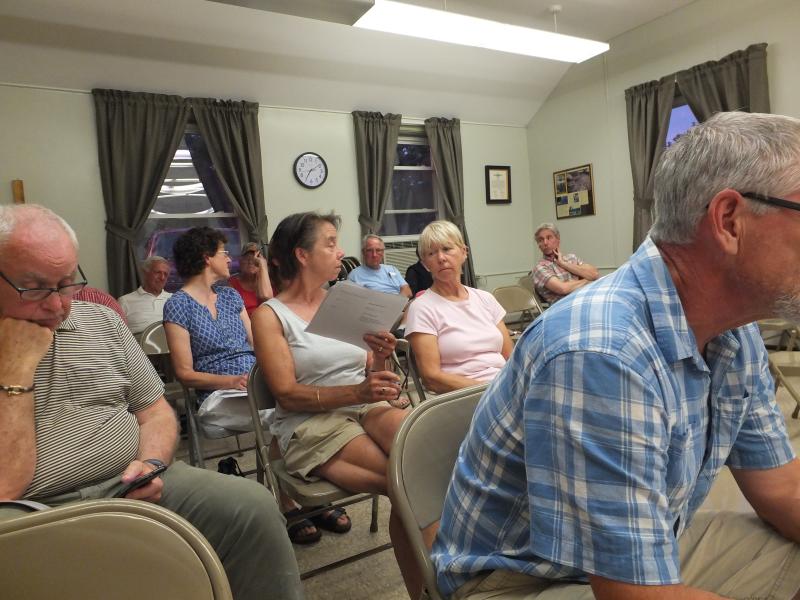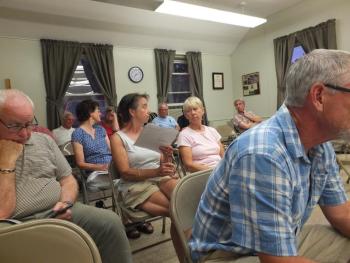Wiscasset taxes hiking 4.2 percent
After hearing some grim details about the town’s finances from auditor Fred Brewer, including that the town had only enough in its fund balance for eight days of expenses, selectmen voted 3-2 Tuesday night to raise the property tax rate to $19.55 for every thousand dollars of assessed valuation, a 4.2 percent hike.
Selectman Ben Rines Jr. proposed taking $100,000 from next year’s fund balance for tax relief. That failed, 4-1. Member Bob Blagden proposed $200,000. That failed 3-2. Chair Judy Colby proposed taking none of it for tax relief. Her motion passed 3-2.
An owner of property valued at $200,000 will see a tax increase of $158.
Brewer had told the board the fund balance was not enough to make ends meet. He said the amount the town should retain to pay its bills was $1.3 million per month to cover expenses. At the end of the fiscal year, Wiscasset held less than $350,000 in liquid assets. The town worked with the school department to use the funds it would have typically received from the town to pay the department’s bills to tide it over when schools were not in session, Town Treasurer Vernice Boyce said. “But the schools are looking to us to start paying them this month,” she said.
There were brighter spots in the audit, including greater than anticipated revenues from several departments. But the clear message from the auditor, echoed by the town treasurer, was that the town must increase its fund balance.
Selectmen also revised the tax anticipation note to name the bank as Bath Savings Institute, after looking at some of the fees associated with the bank they had previously named, Savings Institute of Sanford.
After the vote, selectmen discussed how to improve finances. Blagden and Rines proposed a new round of belt-tightening. Selectman Kim Andersson said the town must think 20 to 30 years down the road. “We have a responsibility to save not only this year’s taxpayers money, but taxpayers in the future,” she said. “That means we need to do some economic development.” Without a planner, that would be difficult, she said. She suggested focusing on a new comprehensive plan and following it closely. She said the schools had advantages the town doesn’t: much more in state funds than the town, and grant-writers who get multiple grants a year.
“When we had a planner, he brought in grant funds,” she said. “We need to find someone who can function as a planner.” She suggested perhaps seeking help from a student associated with the Bowdoin Common Good fund to seek and write grants for the town. She also strongly urged more cooperation between the town and the schools.
Blagden said the schools get too much money, and he didn’t believe any other school district got the amount of money from taxpayers that Wiscasset schools did. Andersson challenged him on that, saying she didn’t know the figures but she didn’t believe his figures of 70-80 percent of the town’s budget were correct. According to Blagden, Wiscasset spent $6 million in taxpayer funds on the schools, and about $5 million on other town functions.
Selectmen approved the avigation agreement the Federal Aviation Adminstration is requiring the town to have with Chewonki Campground, neighbor to the Wiscasset Municipal Airport. The campground’s owners Pam Brackett and Ann Beck, owners of the Chewonki Campground, declined to comment at the meeting. The easement would remove numerous mature trees.
The campground is expected to receive $280,000: Ninety percent paid by the FAA, five percent by the Maine Department of Transportation, and five percent, or $14,000, by the town.
Among other items, the agreement discusses the cutting process, septic system improvements covered in an easement held by Chewonki over the airport, and operational issues such as flight paths and noise abatement.
The town and the campground are still hammering out issues around construction. That will be a separate agreement, according to documents the town released.
A public hearing was held for an annual license renewal for Allen Cohen, who operates a fireworks store on Route 1 and a storage facility for fireworks on JB Way. Speaking against the renewal was the owner of the Schooner Inn and The Taste of the Orient, Celio Juntera, who said his restaurant and motel used propane, and he believed the fireworks store was dangerous.
Tom and Katie Bryant, longtime opponents of the storage facility on JB Way, which is near their home, also spoke, as did their attorney, Jonathan Pottle of Eaton Peabody. He raised many questions about state law on storage facilities where there are no sales of fireworks, as well as the storage of fireworks in Conex boxes. Cohen said he uses the boxes at both the Route 1 store and the storage facility on JB Way.
After the hearing, a motion by Katharine Martin-Savage did not receive a second, and the board put off discussion for two weeks until it had more information from police, fire, and codes enforcement, and got clarification on state law.
During public comment, Steve Christiansen again brought up the trailer that has been in a Middle Street parking lot most of the summer. He was also concerned about tables on sidewalks and banners erected without permission. Kim Dolce asked about the signs posted on different sides of a business, such as the ones near Monkey C Monkey Do.
During the presentation of the Public Advisory Committee report, James Kochan asked again about loading zones downtown. Selectmen said they would bring it up with MDOT. Colby said she was under the impression the loading zones were being put back into place.
Before the board adjourned Savage handed out invitations to an 8 a.m. Friday, Sept. 14 meeting at Sarah’s Cafe. It is a meeting of a new, self-formed downtown committee to promote Wiscasset’s downtown during and after the MDOT construction.
Event Date
Address
United States

























